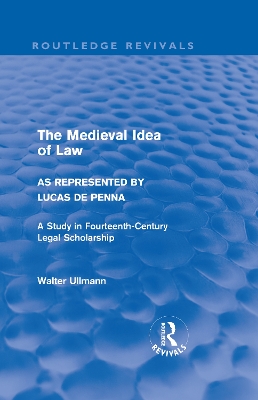Routledge Revivals
4 total works
In many respects this book, first published in 1961, marked a somewhat radical departure from contemporary historical writings. It is neither a constitutional nor a political history, but a historical definition and explanation of the main features which characterised the three kinds of government which can be discerned in the Middle Ages - government by the Pope, the King, the People. The author's enviable knowledge of the sources - clerical, secular, legal, constitutional, liturgical, literary - as well as of modern literature enables him to demonstrate the principles upon which the papal government, the royal government, and the government of the people rested. He shows how the traditional theocratic forms of government came to be supplanted by forms of government based on the will of the people. Although concerned with the Middle Ages, the book also contains much that is of topical interest to the discerning student of modern institutions. Medieval history is made understandable to modern man by modern methods.
The Medieval Idea of Law as Represented by Lucas de Penna (Routledge Revivals)
by Walter Ullmann
Upon its original publication in 1946, this work represented a new approach to medieval studies, offering indispensable analysis to the historian of legal, political and social ideas. Research into the original sources leads the author through unexplored realms of medieval thought. By contrasting contemporary opinions with those of his central figure, Lucas de Penna, he comprehensively presents the medieval idea of law - then regarded as the concrete manifestation of abstract justice. The intensity of medieval academic life is revealed in the heated controversies, whilst medieval criminology foreshadows modern developments. A significant discovery is the astonishingly great reliance which Continental scholars placed upon English thought. A challenge to certain current misconceptions, this book shows the resourcefulness of medieval thinking and the extent to which modern ideas were foreshadowed in the fourteenth century, a time when the ideas of law and liberty were identical.
The Individual and Society in the Middle Ages (Routledge Revivals)
by Walter Ullmann
Originally published in 1967, these lectures delivered at The Johns Hopkins University focus attention on the historically and politically crucial distinction between the individual as a mere subject of higher authority and the individual as an autonomous and independent citizen. The author's command of the source material enables him to show why the conception of the individual as a subject predominated in the earlier Middle Ages. He throws into clear relief the multifarious factors which brought about the emergence of the citizen as an individual taking full part in public government. Ullman's studies demonstrated the constructive role which feudalism played in the transformation of the subject into a citizen, and in doing so throw much light on the development of English common law and set the problem of modern constitutionalism in its historical context. The book opens up entirely new perspectives in the history of political and social ideas.
The Individual and Society in the Middle Ages (Routledge Revivals)
by Walter Ullmann
Originally published in 1967, these lectures delivered at The Johns Hopkins University focus attention on the historically and politically crucial distinction between the individual as a mere subject of higher authority and the individual as an autonomous and independent citizen. The author's command of the source material enables him to show why the conception of the individual as a subject predominated in the earlier Middle Ages. He throws into clear relief the multifarious factors which brought about the emergence of the citizen as an individual taking full part in public government. Ullman's studies demonstrated the constructive role which feudalism played in the transformation of the subject into a citizen, and in doing so throw much light on the development of English common law and set the problem of modern constitutionalism in its historical context. The book opens up entirely new perspectives in the history of political and social ideas.

